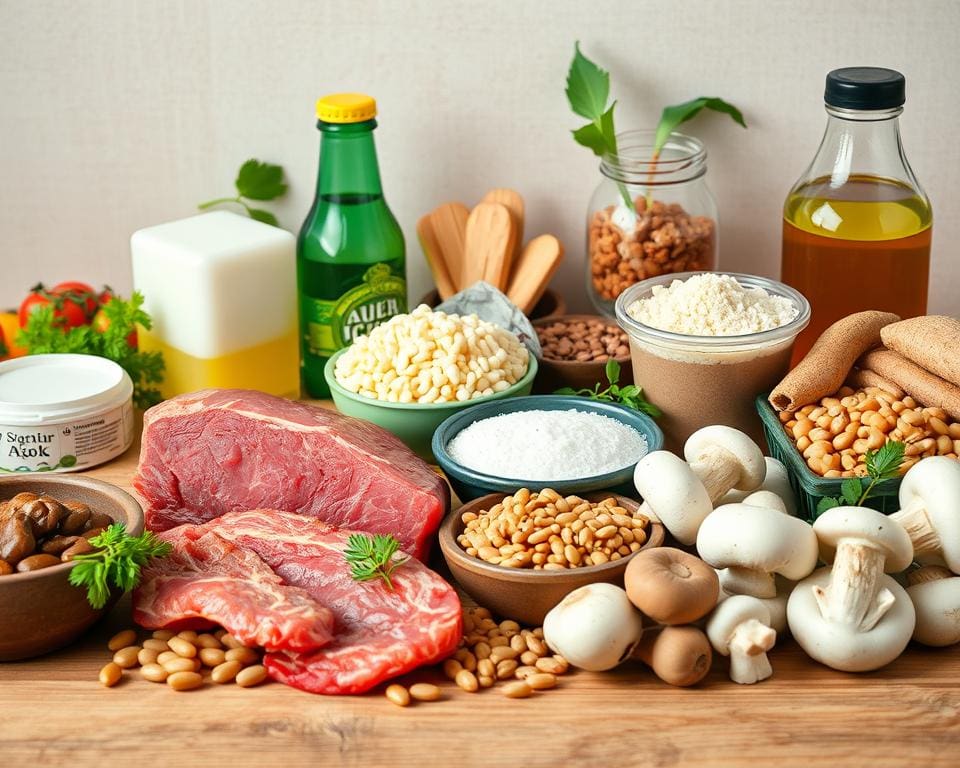Gout is a type of arthritis marked by sudden and intense pain, often appearing in the big toe. This condition arises when there are elevated levels of uric acid in the blood, a situation frequently exacerbated by the consumption of certain foods. Understanding what foods causes gout is essential for individuals seeking to manage or prevent flare-ups. Central to this is the role of purine-rich foods, which contribute significantly to uric acid production. By adopting a well-informed gout diet, you can make dietary choices that positively influence your health and minimise discomfort.
Understanding Gout and Its Triggers
Gout is a complex form of arthritis characterised by the accumulation of uric acid in the bloodstream, resulting in painful joint inflammation. When the body produces too much uric acid or fails to eliminate it effectively, crystals can form in the joints, leading to discomfort and swelling. Recognising the various triggers for gout can play a pivotal role in managing this condition.
While diet significantly influences gout flare-ups, there are several other factors that can exacerbate symptoms. Understanding these factors will empower individuals to take proactive measures in preventing attacks. Some common triggers include:
- Dehydration: Insufficient fluid intake can elevate uric acid levels in the body, resulting in agonising flare-ups.
- Stress: High stress levels can interfere with the body’s overall balance, potentially leading to increased uric acid production.
- Medications: Certain prescription drugs can raise uric acid levels, making individuals more susceptible to gout attacks.
Identifying and understanding specific gout flare-up foods, such as high-purine items, is crucial for those aiming to manage their symptoms effectively. Personal awareness of one’s body responses to various triggers enhances the ability to live a fulfilling and active life.

What Foods Causes Gout
Understanding the role of diet in gout management is crucial for those affected by this condition. Certain foods are notorious for raising uric acid levels, leading to painful gout flare-ups. Identifying and limiting these high purine foods can significantly help in managing symptoms.
High Purine Foods That Contribute to Gout
High purine foods should be avoided to reduce the risk of uric acid accumulation. These include:
- Red meats like beef and lamb
- Organ meats such as liver and kidneys
- Certain seafood options, particularly sardines and anchovies
These types of meats and seafood are known to increase uric acid levels, making them vital to consider when discussing foods to avoid with gout.
Other Potential Gout Triggers
In addition to high purine foods, other items can trigger gout flare-ups. Some individuals may find that various beans and legumes contribute to discomfort. Understanding personal tolerance is essential.
It’s advisable to recognize your unique triggers. Keeping a food diary may help identify which gout flare-up foods are problematic. Through careful observation and dietary choices, managing gout can become a more achievable objective.
The Role of Diet in Gout Management
Diet plays a crucial part in managing gout symptoms. The right nutritional choices can help alleviate discomfort and reduce the frequency of flare-ups. A well-planned gout diet not only focuses on avoiding high purine foods but also emphasises the inclusion of beneficial elements that contribute to overall health and well-being.
How Nutrition Affects Gout Flares
Understanding the impact of nutrition on gout flares is essential for effective management. Certain foods can lead to increases in uric acid levels, triggering painful episodes. A focus on low purine foods assists in mitigating these risks. Foods rich in potassium, such as bananas and oranges, can help regulate uric acid levels. Hydration also plays a vital role; adequate fluid intake, particularly water, is key in flushing out excess uric acid from the body.
Creating a Balanced Gout Prevention Diet
Developing a balanced gout prevention diet is a proactive approach to managing this condition. Key components include:
- High fibre fruits and vegetables to enhance digestion and promote overall health.
- Whole grains, which provide essential nutrients while being low in purines.
- Lean proteins, including poultry and low-fat dairy, as safer alternatives to red meats and seafood.
- Healthy fats, such as those found in olive oil and avocados, to support heart health.
Focusing on nutrition for gout prevention not only aids in maintaining a healthy weight but encourages a lifestyle that supports lower uric acid levels. Embracing these dietary principles can significantly improve quality of life for those affected by gout.
Foods to Avoid with Gout
Managing gout effectively requires a keen awareness of the foods to avoid with gout. Certain foods can significantly elevate uric acid levels, which in turn can trigger painful flare-ups. By eliminating high purine foods from your diet, you can pave the way for a more comfortable existence free from the discomfort of gout.
Common High Purine Foods
Various high purine foods can be particularly detrimental for individuals with gout. It’s essential to limit or entirely avoid the following:
- Game meats such as venison and pheasant
- Organ meats like liver, kidneys, and sweetbreads
- Certain types of seafood, including sardines, anchovies, and herring
- Red meat, particularly beef and lamb
- Gravies and meat-based broths
Processed Foods and Sugary Drinks
Not only should one steer clear of high purine foods, but processed foods and sugary drinks must also be limited. These items often contain hidden sugars and unhealthy fats that can exacerbate inflammation and raise insulin levels:
- Soft drinks and sweetened fruit juices that add to sugar intake
- Packaged snacks and fast food that are typically high in unhealthy fats
- Refined carbohydrates, such as white bread and pastries
Gout-Friendly Diet Options
For those prone to gout, embracing a gout-friendly diet is crucial in managing symptoms and preventing flare-ups. Adopting low purine alternatives can provide relief while ensuring nutritional needs are met. It is important to explore various food options that not only support overall health but also help maintain a balance in uric acid levels.
Low Purine Alternatives
When selecting foods that contribute to a gout-friendly diet, individuals should focus on incorporating low purine alternatives. These options include:
- Low-fat dairy products, such as yoghurt and milk, which can be beneficial
- Whole grains like brown rice and oats that provide essential nutrients
- Fruits such as cherries, strawberries, and oranges, known for their antioxidant properties
- Vegetables that can be enjoyed in abundance, including spinach, kale, and bell peppers
Nutrition for Gout Prevention
A well-rounded diet plays a significant role in preventing gout attacks. Foods rich in vitamins and antioxidants help reduce inflammation and support the body’s natural defences. Regularly consuming the following can be advantageous:
- Vitamin C-rich fruits and vegetables
- Omega-3 fatty acids from sources such as flaxseed and walnuts
- Hydration through plenty of water and herbal teas
Alcohol and Gout: What You Need to Know
Understanding the relationship between alcohol consumption and gout is vital for those aiming to manage this condition effectively. Different types of alcohol can act as an alcohol trigger for gout, contributing to increased uric acid levels and subsequently leading to painful flare-ups. It is essential to identify which beverages might pose a problem and to explore sensible alternatives.
Types of Alcohol That Can Trigger Gout
Beer is one of the most significant culprits when it comes to gout, largely due to its high purine content. Other spirits, such as vodka and whisky, can also provoke symptoms in some individuals. Certain types of wine may present a risk too, depending on the individual’s overall diet and genetics. Understanding which drinks have a more pronounced effect can help in making informed choices that align with a healthier gout diet.
Moderation and Alternatives for Gout Sufferers
Moderation is key for individuals who enjoy an occasional drink but need to be mindful of how it affects their condition. Opting for low-alcohol beverages or non-alcoholic options can significantly help in managing gout symptoms effectively. Options such as herbal teas or sparkling water with a splash of fruit can serve as refreshing alternatives while maintaining a balanced gout diet. Embracing these alternatives not only aids in symptom control but fosters a healthier lifestyle overall.
High Purine Foods: A Deeper Dive
Understanding the impact of high purine foods is crucial for effectively managing gout. Certain animal-based proteins can significantly elevate uric acid levels, leading to painful flares. Identifying which foods to avoid with gout can empower individuals to make better dietary choices and foster overall health.
Animal-Based Proteins to Limit
Many animal-based proteins are recognised for their high purine content. Consider limiting or avoiding the following:
- Red meats such as beef and lamb
- Pork and veal
- Organ meats, including liver and kidney
These options may contribute to excessive purine intake, making it wise to seek alternatives that are lower in purines.
Seafood Choices to Avoid
Some seafood options, particularly shellfish and oily fish, should be approached with caution due to their high purine levels. The following are some of the prime culprits:
- Sardines
- Mussels
- Anchovies
- Herring
Remaining mindful of these foods can help reduce the frequency of gout attacks and support a healthier lifestyle.
Lifestyle Changes to Manage Gout
Adopting specific lifestyle changes for gout can vastly improve one’s quality of life. Small adjustments can lead to significant benefits, particularly in relation to hydration and exercise. Taking charge of these aspects not only aids in preventing flare-ups but also enhances overall well-being.
The Importance of Hydration
One of the most crucial lifestyle changes for gout involves understanding the importance of hydration. Drinking plenty of water supports the kidneys in flushing out excess uric acid, a primary contributor to gout attacks. Aim for at least eight glasses a day, as proper hydration can significantly impact joint health.
Regular Exercise and Weight Management
Incorporating regular exercise into daily routines is vital for those managing gout. Physical activity helps maintain a healthy weight, which is essential since excess weight can increase uric acid production. Engaging in moderate exercise, such as walking or swimming, not only aids weight management but also promotes better joint function.
Consulting Medical Professionals
Managing gout effectively requires more than just dietary adjustments; it necessitates professional guidance. Consulting doctors for gout is paramount, particularly for individuals seeking a tailored approach to their condition. Rheumatologists and dietitians are invaluable resources in this journey, equipping patients with personalised dietary plans and medication management strategies that cater to their unique needs.
Regular follow-ups with healthcare providers are crucial for monitoring uric acid levels, enabling proactive management of the condition. Keeping track of these levels can prevent flare-ups and enhance overall health, offering peace of mind for those living with gout. Consulting doctors for gout not only provides access to vital medical insights but fosters a supportive partnership in the quest for improved well-being.
By prioritising consultations with healthcare professionals, individuals can embark on a comprehensive management plan that empowers them to take control of their health. The journey may require adjustments and patience, but with the right guidance, living well with gout is achievable.









